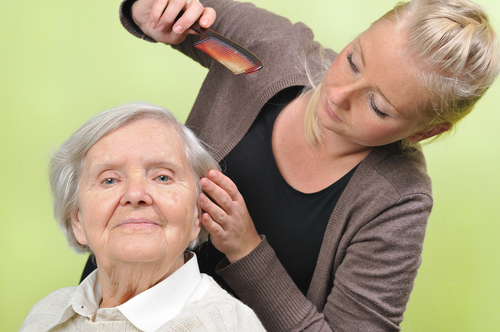Dementia is a disease that affects a person’s ability to problem solve. It affects memory and thinking, language, and judgment, and it even causes physical problems such as the ability to walk. There can be personality changes as well. The person with dementia may become withdrawn, anxious, or paranoid.
Dementia is a progressive disease and it continues to worsen. However, the rate of speed of the progression can vary from person to person. The progression of one symptom can be much faster than another symptom. These are the seven stages of dementia:
1. No Impairment. In stage one there are no outward signs of dementia. Family and friends, as well as professionals, will be unable to detect the disease.

2. Very Mild Cognitive Decline. At this stage, the person is starting to have some forgetfulness. The person may attribute it to normal aging forgetfulness, and it is still generally not noticeable to the family and friends of the person.
3. Mild Cognitive Decline. Stage three is the first time family and friends may notice changes. The person may have problems concentrating and have increased forgetfulness. The job performance of those who are still working may suffer. Those who are not employed may have an increased difficulty with higher level tasks such as balancing a checkbook. The maintenance of the home may decline. The person will have increasing difficulty with speech, such as finding the right word. They may get disoriented or even lost. This stage usually lasts approximately seven years.
4. Moderate Cognitive Decline. At this point, the person is diagnosed with early-stage dementia. It will be easy for a professional to identify dementia in the person through an exam and questions. The individual may start forgetting recent events and have increasing forgetfulness. They will have increasing difficulty with higher level tasks such as managing finances and problem solving.
It is more difficult to organize and express thoughts. They can easily become disoriented when traveling away from home. The person may be in denial about what is happening to them and may withdraw from friends and family to avoid discovery. This stage usually lasts about two years.
5. Moderately Severe Cognitive Decline. This stage lasts about one and a half years. There will now be major memory losses. They may not remember what their address is or be able to give their phone number. Often the person will need increasing help with meal preparation, dressing, and bathing. They may become disoriented to time and place.

6. Severe Cognitive Decline. In this stage, the person may forget the names of close friends and even family. They have little memory of recent events but even begin to lose their memory of their early life. They will need substantial dementia care and help for all activities. They may become incontinent. Their ability to communicate is severely limited. There may be mental and emotional changes as well. The person may suffer extreme anxiety, paranoia, and even delusions.
7. Very Severe Cognitive Decline. This final stage of dementia can last about two and a half years. In this stage, the person needs complete assistance with all tasks. A dementia care plan must include around the clock care. The person with dementia may have lost the ability to speak or walk. Vision and hearing become difficult. They may still see and hear but their brain can’t process it in a meaningful way.

Everyone’s journey with a diagnosis of Alzheimer’s or dementia is different both for them and the people who provide dementia care for them. This list gives you an idea of what to expect. Remember that these stages can take longer or be very fast in some cases.
Also, a person can be in different stages at the same time. For instance, their speech might be intact but there are no memories after childhood. It is a difficult disease for both the person who is diagnosed with it and the friends and family of that person. Reach out for support. You may just need someone to vent with or you might need advice on assistive equipment or professional dementia home care. The more resources you develop, the less stress and uncertainty you will have.

